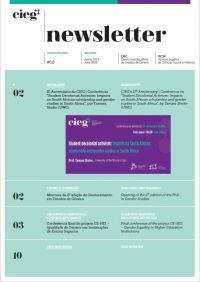Versão portuguesa disponível aqui.
Gender, Feminist and Women's Studies: Knowledge, Public Policies and Social Justice
Gender, feminist and women’s studies are currently faced with new challenges and the deepening of old obstacles that compromise their future or may even block it in some countries. The latest financial crisis was followed by a pandemic on a scale only encountered over a century earlier. When this disruption of ways of life and family dynamics was thought to be over, the outbreak of war in Europe accentuated economic struggles, trivialised violence, provoked waves of forced emigration, and accentuated conflict in international relations. This sequence of events was accompanied by the emergence of authoritarian leaderships, by a backlash against science and defence of unfounded knowledge, gathering support from many people, and by a growing influence of religious and political movements, such as populism, seeking to subvert the rule of law and democratic regimes.
Debate and controversy in the public sphere have grown increasingly polarised, often evolving into open conflict and intense antagonism. In this scenario, old challenges such as anti-feminism and attacks on gender studies and gender equality have led to significant setbacks in rights and the attempt to exclude gender studies from academia in some countries. The recent U.S. Supreme Court ruling on abortion sets an extreme example of the retreat of a right recognized for 50 years.
Still, these attacks on gender equality and LGBTQIA+ rights, clear manifestations of sexism, homophobia, racism, classism, and sexual violence, have met strong resistance and opposition from movements mobilising thousands and thousands of people on the streets, media and social media, in truly global events. This contestation, despite involving various sectors of the population, was often mobilised by young people, as in the recent and courageous case of young Iranian women.
It must also be acknowledged that there have been important rights achievements in many countries in recent years, such as the recognition of the right to abortion in Argentina, or of the right to same-sex marriage or gender self-determination, in many countries.
Despite these contrasting dynamics, the advances of authoritarian and far-right forces are particularly concerning, recently rising to power in some European countries, or even though they lost it in others, like the US and Brazil, persisting in underground mobilisations that erode democratic values, preach violence, and call into question basic human rights.
These changes to the quality of democracies, and the struggle for rights and for the improvement of people's living conditions, make gender, feminist and women’s studies increasingly relevant, especially in their intersection with social inequalities, racism, and colonialism, even in a context of polarised debate
The Interdisciplinary Centre for Gender Studies thus invites researchers from national and international institutions to contribute to enhancing knowledge on gender equality issues in different countries, but also on current challenges and future prospects for gender, feminist and women’s studies, through the presentation and debate of research on the following topics:
Gender, feminisms and women’s studies
- Epistemological debates, advances, intersectionality and fragmentations: feminist, queer, trans theories, and others
- Masculinities and critical men’s studies
- Black feminism and post-colonial studies
- Spatial dimensions of violence and struggle: from home, to city and territory
- Cultural and artistic expressions
- Gender violence and sexual violence: old problems and new challenges
Policies, institutions and citizenship
- Antifeminism, religious movements, and the backlash against science
- International conflicts and impacts on migration, asylum, refuge, human trafficking, and other issues
- War in Europe and its implications from a gender perspective
- Public policies, feminist agendas and pinkwashing
- Authoritarianism, far-right movements, and attacks on gender equality
- Cyberfeminism, social media and the polarisation of public space
- Media, communication, representation and image
Gender and living conditions
- Gender equality, poverty and the deterioration of living standards
- Effects of the pandemic on gender relations
- Intersections: sexism, racism and social inequalities
- Health, ages of life and ageing
Gender and sexualities
- LGBTQIA+ Studies
- Gender identity and expression, and sex characteristics
- Sexuality and corporeality: diversity of meanings and practices
- Sex work, prostitution
Information for submission:
Proposals must contain a maximum of 300 words. Each person may submit a maximum of 2 abstracts as main author.
Congress's accepted Languages: Portuguese, English and Spanish
Important dates:
- October 15th, 2023 - Deadline for abstracts submission.
- November 15th 2023 - Deadline for notice of abstracts’ acceptance/rejection.
- December 11th, 2023 - Deadline to register with a reduced Early Bird registration fee.
- December 31st, 2023 - Final registration deadline for participants with accepted abstracts (Participants not registered will be withdrawn from the Congress Programme).
Registration fees
|
Registration fee |
Early bird (up until December 11th 2023) |
After December 11th 2023 |
|
Participant |
250 € |
300 € |
|
Student |
90 € |
140 € |
|
Lower income e middle-lower income countries |
170 € |
220 € |
| 1 day fee | 100 € | 100 € |

